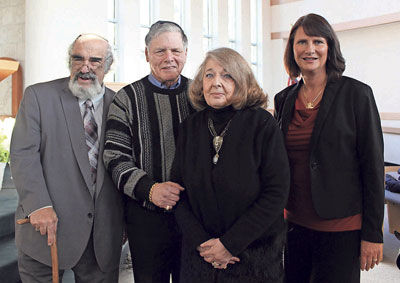By Lea Kahn, Staff Writer
LAWRENCE — Barely 5 feet tall and just 18 years old, Irena Gut Opdyke was the most unlikely of heroines during World War II.
But the Polish nursing student and sometime revolutionary — she was a member of the Polish resistance movement — was responsible for saving the lives of a dozen Jews from the Holocaust during the war.
The story of how Ms. Opdyke saved them was shared with about 50 attendees at the 9th annual Sacks-Wilner Holocaust Education Program at Adath Israel Synagogue by her daughter, Jeannie Opdyke Smith, last week.
“If my mother were here, she would start her talk like this — ‘I come here because I love you.’ She meant it,” Ms. Smith said of her mother. Born Irena Gut, she was the eldest of five sisters. Her father was an architect in Poland.
Ms. Smith said her mother wanted to become a nurse, and was admitted to a nursing school about 200 miles from home. She was on her way to classes on the sunny morning of Sept. 1, 1939. But a short time later, the sun disappeared from the skies — hidden by the German warplanes that were dropping bombs on the city.
That’s the day that the Germans invaded Poland and obliterated it from the map. But many Poles were unwilling to accept it, and formed a resistance movement to the German occupation, Ms. Smith said. Her mother joined the Polish resistance movement.
While she was waiting for a group of resistance movement fighters to return — she had been left to guard the trail — she was set upon by a group of Russian soldiers, Ms. Smith said. She was beaten and left for dead. But another group of Russian soldiers found her and took her to a hospital.
When she recovered, she became a forced laborer — first, in a Russian hospital and then in a German munitions factory in occupied Poland. One day, she became sick and fainted, Ms. Smith said. A German army major had just entered the factory and saw her. When she woke up, she found herself in his office.
Major Eduard Rugemer liked her mother, Ms. Smith said. She had blonde hair and blue eyes, and could have passed for a German. The major gave her a job in a hotel serving meals to Nazi soldiers. She was able to sneak food out of the hotel and pass it on to the Jews in the nearby ghetto.
Ms. Opdyke had been aware of the atrocities committed by the Nazis on the Jews, Ms. Smith said. She watched as a German soldier grabbed a Jewish baby from its mother’s arms, tossed the child into the air and shot the child, much as a hunter would shoot a bird.
Her mother, who was raised as a Catholic, could not believe what she had just observed, Ms. Smith said. She believed in free will — the ability to choose whether to hurt or to help. She promised herself that if she could help someone, she would do it.
While serving meals to the Nazi soldiers, she overheard them talking about plans to kill the Jewish forced laborers and others in the ghetto in Ternopol. Ms. Opdyke smuggled a group of Jews into the villa where she served as a housekeeper to Major Rugemer. It was a risky move, because anyone caught harboring Jews would be killed.
The Jews hid successfully from Major Rugemer for awhile, but they were eventually discovered, Ms. Smith said. Her mother pleaded with Major Rugemer to spare them. He was in a difficult position, because he would have been killed if the Jews had been discovered under his roof — whether or not he knew of it.
Major Rugemer agreed to spare their lives, but for a price — Ms. Opdyke had to become his mistress, Ms. Smith said. Months later, when it became clear that the Germans were losing the war, everyone fled the villa into the woods. The Russians captured the area, freeing everyone.
But Ms. Opdyke’s travails were not over. Searching for her own family, she was captured by the Russians, Ms. Smith said. They believed she was a spy and threatened to send her to Siberia. But some Jewish friends helped her to escape and disguised her as a Jewish refugee. She lived in a displaced persons camp with other Jews.
While she was in the displaced persons camp, she was interviewed by United Nations representative William Opdyke, Ms. Smith said. Impressed by her story, he encouraged her to immigrate to the United States. She left Europe and settled in New York City in 1949.
“After five years, my mother became an American citizen. No one loved the United States as much as she did,” Ms. Smith said. It was around that time that her mother bumped into a man — Mr. Opdyke — at the United Nations cafeteria at lunch, and discovered that he was the same one who had interviewed her in the displaced persons camp. They married and moved to California.
Ms. Smith said she was unaware of her mother’s story until Ms. Opdyke was called at random by a college student who was researching the Holocaust and whether it really occurred. That’s when Ms. Opdyke decided that she had to speak up and tell her story.
As a post-script, both Ms. Opdyke and Major Rugemer were honored by Yad Vashem, the World Holocaust Remembrance Center, in Israel. Their names are included in the list of “Righteous Among the Nations” — non-Jews who risked their lives to save Jews during the Holocaust. Ms. Opdyke was named in 1982 and Major Rugemer in 2012.
“One person can make a difference. It doesn’t matter who you are. You have the opportunity every day to stand up against something that is wrong. Teach it to your children. Start today,” Ms. Smith said.

